As if the world of travel distribution wasn’t complicated enough, the topic of the travel agency accreditation is another maze to navigate. Organizations like IATA, ARC, CLIA, or CCRA issue special codes to travel agencies that grant access to special capabilities and perks. And it can be confusing to know which ones do what.
Should you get accredited, and if so, why? Is it worth the trouble, and can you succeed without an accreditation? Also, which among many accreditation acronyms to choose, and how are they different? Here, we will cover all the accreditation types, their application processes, and benefits to help you make an educated choice.
What is travel agency accreditation? Why do you need it?
In the air travel space, there are many more companies selling travel services than the ones providing them. For example, there are about 5,000 airlines but over 80,000 travel agencies in the US alone. So it makes sense that suppliers want to make sure that parties selling their tickets can be trusted and provide professional service. And how do you know which agency to trust? You need some form of verification.
That’s what accreditation is for. IATA, ARC, CLIA, or CCRA control the business of distributing travel services and accredit travel sellers that adhere to certain requirements. They assess potential partners before giving them the tools to sell flights, hotels, and cruises.
When you’re accredited, it typically means that you have a personal code or a number that allows other industry players (mostly, suppliers) to recognize you as a legitimate partner. It’s almost like an exclusive membership club, and you want to become a part of it if you want to succeed.
You don’t always need to obtain the accreditation yourself. If you’re a smaller business, you can join a hosting agency – a big, thriving business with a strong market presence and customer base. A host agency has accreditation and shares their membership with you for a commission on your sales. Many start-up travel agencies or individual agents join a host agency for access to booking capabilities. But not all want to do this.
So who needs accreditation? There are three main groups.
Independent agents and agencies. Either home-based or storefront agencies that don’t want to share their sales with a middleman might choose to be accredited themselves instead of using the services of a host agency.
Hosted agencies. At the same time, some agencies that are already using the accreditation of their host might choose to get accredited for a specific reason. For example, they want direct access to suppliers but still want a host agency to manage ticketing for them. So they might obtain accreditation without ticketing, which is often cheaper and less cumbersome. We will talk about ticketing a bit further in the article.
Corporate Travel Departments. There are special programs not for agencies but for organizations that regularly book travel for their employees’ business trips. They can be accredited to book with suppliers directly and save money on travel expenses.
To learn more about various travel agency software, see our article.
In this article, we will cover the following accreditation paths.
- IATA accreditation for selling air travel worldwide
- ARC accreditation for selling air travel in the US
- CLIA accreditation for cruise booking
- TRUE accreditation for cruise and tours booking
Each of these options covers different travel niches, some provide ticketing capabilities while others don’t, and some accept international agents. Which should you choose? Let’s cover them one by one.
IATA accreditation for air travel: IATA vs IATAN vs TIDS
International Air Transport Association or IATA is a global trade association of airlines that develops standards and practices for the aviation industry. IATA accreditation exists to verify travel agencies and control the revenue flow. It’s accepted worldwide.
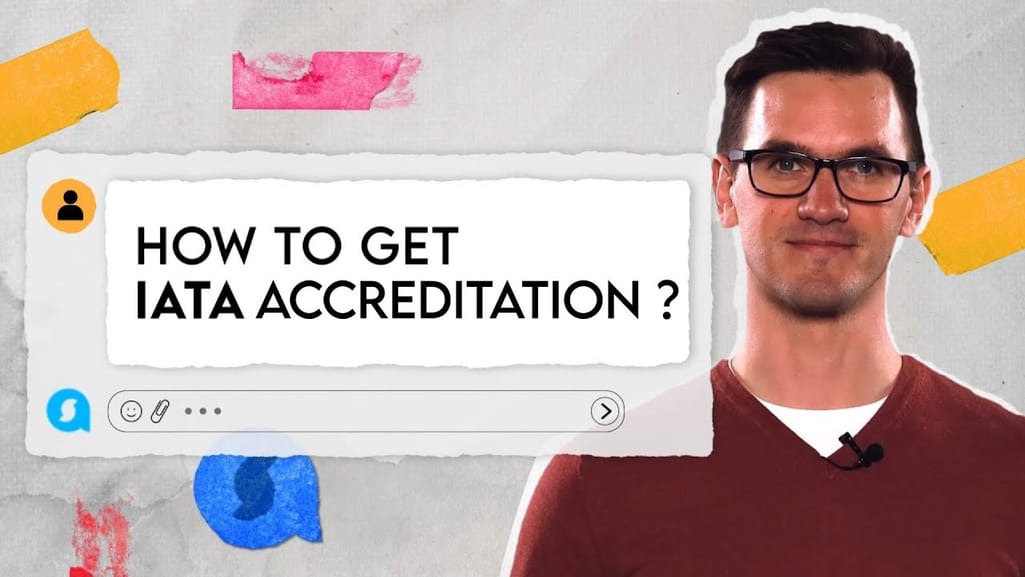

Watch our expert explain all about IATA Accreditation
There’s also IATAN or International Airlines Travel Agent Network that is basically the same thing but specifically for US-based travel agencies.
We have a dedicated article about obtaining all types of IATA accreditation, but here we will give a few main points for easy comparison.
So what does having that IATA Numeric Code mean for travel agents?
Airline ticketing capability. An IATA-certified travel agency can do airline ticketing on behalf of an airline. Ticketing is the process of confirming a transaction, which is done via special billing software – IATA’s BSP or US-only ARC. Agencies get access to that software only with accreditation that includes ticketing. Without it, an agency must do ticketing via middlemen, which creates extra expenses and takes longer. There are, however, options for accreditation without ticketing capabilities.
Credibility and industry recognition. With the IATA logo on your website, you don’t have to gain additional trust or prove your legitimacy to airlines or hotels. When suppliers see that IATA has already checked that your procedures adhere to industry standards, you can build strong relationships with them or even directly negotiate exclusive rates.
Financial control. With IATA accreditation, agencies have access to their billing software called Billing and Settlement Plan (BSP) and can process and report payments and issue tickets easier.
IATA has a flexible accreditation program with four options depending on your needs and region.
For non-US travel agencies, there’s
- full IATA accreditation – a standard approach for international businesses that want to support ticketing and
- a TIDS (travel industry designator services) code – a non-ticketing IATA accreditation. A TIDS code is simply an identification that helps your supplier network grow. It’s also used to grant commissions.
For US-based agencies, there are similar programs:
- IATAN accreditation – the same as the full IATA accreditation but for US businesses only and
- IATAN non-ticketing accreditation that provides the same opportunities a TIDS code does.
Let’s cover them all separately.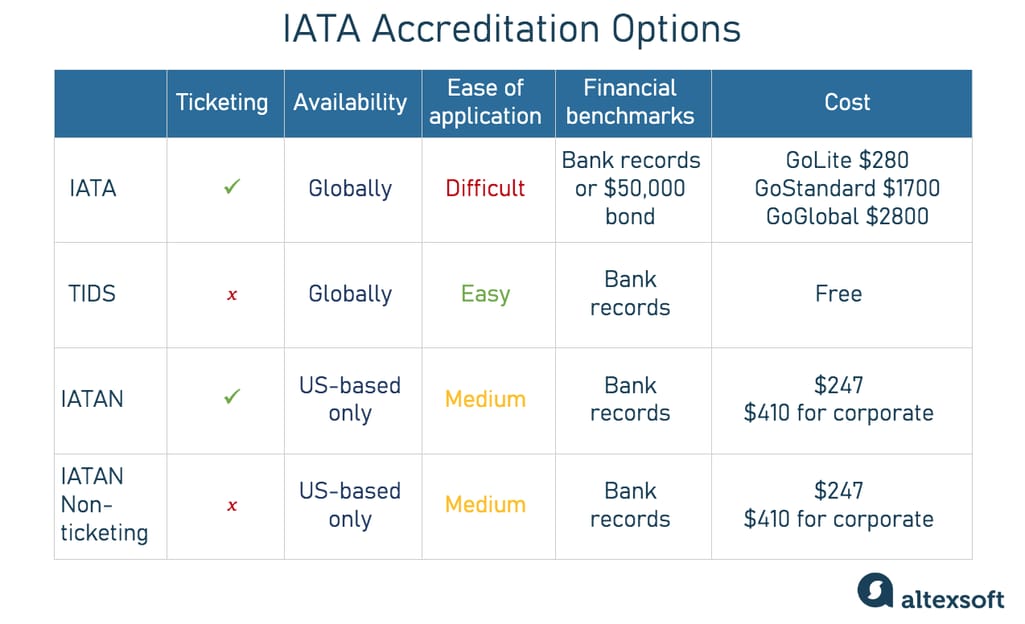 Overview of IATA accreditation options
Overview of IATA accreditation options
Full IATA accreditation
This is one of the main travel agency accreditation options.
Who is it for? This option is for any non-US based agency (home-based or storefront) that sells a lot of air tickets and wants to do their own ticketing.
How to apply? This is how to apply for IATA accreditation.
- Prepare the following documents:
- proof of general business operations,
- proof of your qualifications,
- confirmation of travel agent experience,
- proof of financial viability.
- Register at the Customer Portal.
- Submit the application form with required documents.
- Pay the registration fee.
How much does it cost? Within the IATA accreditation program, there are three levels that you can change any time: GoLite, GoStandard, and GoGlobal. They’re all very similar in capabilities, except that GoLite doesn’t have some payment capabilities, and only the GoGlobal option has multi-country coverage. The application fee ranges accordingly from 250 CHF (~$280) to 1500 CHF (~$1700) and 2500 CHF (~$2800). There’s also an annual fee if you’re accepted that will be based on your gross annual sales through the BSP.
IATA might also request proof of financial security from you, which you must provide within 30 days. Once they receive all documents, the evaluation will start and usually takes around 2 weeks.
TIDS accreditation
Travel Industry Designator Service is an IATA program that provides travel agents with a unique code known as the IATA code or the TIDS code without the need for full accreditation. It’s used to identify sellers in global reservation systems and allows travel suppliers such as airlines, hotels, and car rentals to identify points of sale. If you’re an IATA accredited agent, you already have an IATA code, so you don’t need to apply for TIDS.
Who is it for? Basically, any company that provides travel booking services, such as air, hotel, car, cruises, etc., can apply for TIDS. TIDS is not available in the US, where this service is covered by IATAN.
How to apply? This is how to apply for TIDS.
- Prepare the following documents:
- confirmation of business ownership,
- copy of business registration,
- bank statement,
- one letter of recommendation from an IATA Airline, GDS, or other major industry supplier,
- travel agency license,
- signed copy of the TIDS Terms and Conditions.
- Register at the Customer Portal.
- Select TIDS.
- Submit your application for review.
How much does it cost? The TIDS registration is free of charge. There are also no annual fees, but you will need to complete the Annual Revalidation.
Learn more about the application process at this page and on the TIDS FAQ section.
Full IATAN accreditation
Although the idea behind IATA and IATAN accreditation is the same, there are a few differences between them:
- IATAN is used only for US-based travel businesses with over 2 years of experience and
- in the US, all payment transactions are processed not in BSP, but via the Airline Reporting Corporation (ARC).
Who is it for? IATAN is for US-based travel businesses who want to book and issue flight tickets.
How to apply? This is how to apply for IATAN accreditation.
- Prepare the following documents:
- ARC approval,
- business license,
- proof of ownership,
- proof of Seller of Travel Registration for states of California, Florida, Hawaii, Iowa, and Washington,
- proof of two years of experience.
- Fill out the required forms (click to download .zip file).
- Submit the documents and forms at info@iatan.org.
- Pay registration fees.
How much does it cost? IATAN accreditation costs $247 for a head office or branch and $410 for a corporate travel department. Annual service fees are $103 and $184 respectively.
The response/wait time is typically 4 to 6 weeks.
Non-ticketing IATAN accreditation
This option is similar to what TIDS offers to global travel agents – booking capabilities, recognition, and credibility, but no ticketing capabilities.
Who is it for? This option is suitable for organizations that don’t plan to issue flight tickets but want to book flights directly from airlines. For example, home-based, storefront, meeting-planner businesses, or corporate travel departments.
How to apply? The process is similar to that of a standard IATAN application, but you don’t have to prepare the ARC approval. Check out the file we shared above (click to download .zip file) for the breakdown of the financial documents your type of business will need to provide.
How much does it cost? The fees are the same as above in the full IATAN accreditation section.
Read more about the process and requirements here.
ARC accreditation for airline booking in the US
Airline Reporting Corporation or ARC regulates transactions between airlines and travel agencies registered in the United States, the US Virgin Islands, Puerto Rico, and/or American Samoa. Basically, it receives all money from agencies and sends it to airlines. At the same time, it pays agencies commissions on behalf of airlines. As we mentioned before, you can call it the US alternative to IATA BSP.
ARC also issues accreditation to agencies that want to sell and issue flight tickets. Basically, the benefits are the same provided by IATA: ticketing capabilities, credibility, and access to reporting tools.
So what’s the difference between IATAN and ARC in terms of accreditation, then? Well, ARC was the first to assign travel agency codes in the US, and then IATAN was introduced to mimic the ARC codes, so that international air carriers recognize them. You can have one or both. It doesn’t really matter since they replicate one another, but different ID cards can have different discounts.
ARC has three types of accreditation.
- ARC-Accredited Agency – the most complete option that enables ticketing for you.
- Verified Travel Consultant (VLC) – the same but without ticketing capabilities.
- Corporate Travel Department (CTD) – option for businesses not in the travel industry.
Let’s cover which one you might need. Also, check out our separate article on ARC accreditation, where we cover ARC’s role and the accreditation process in more detail.
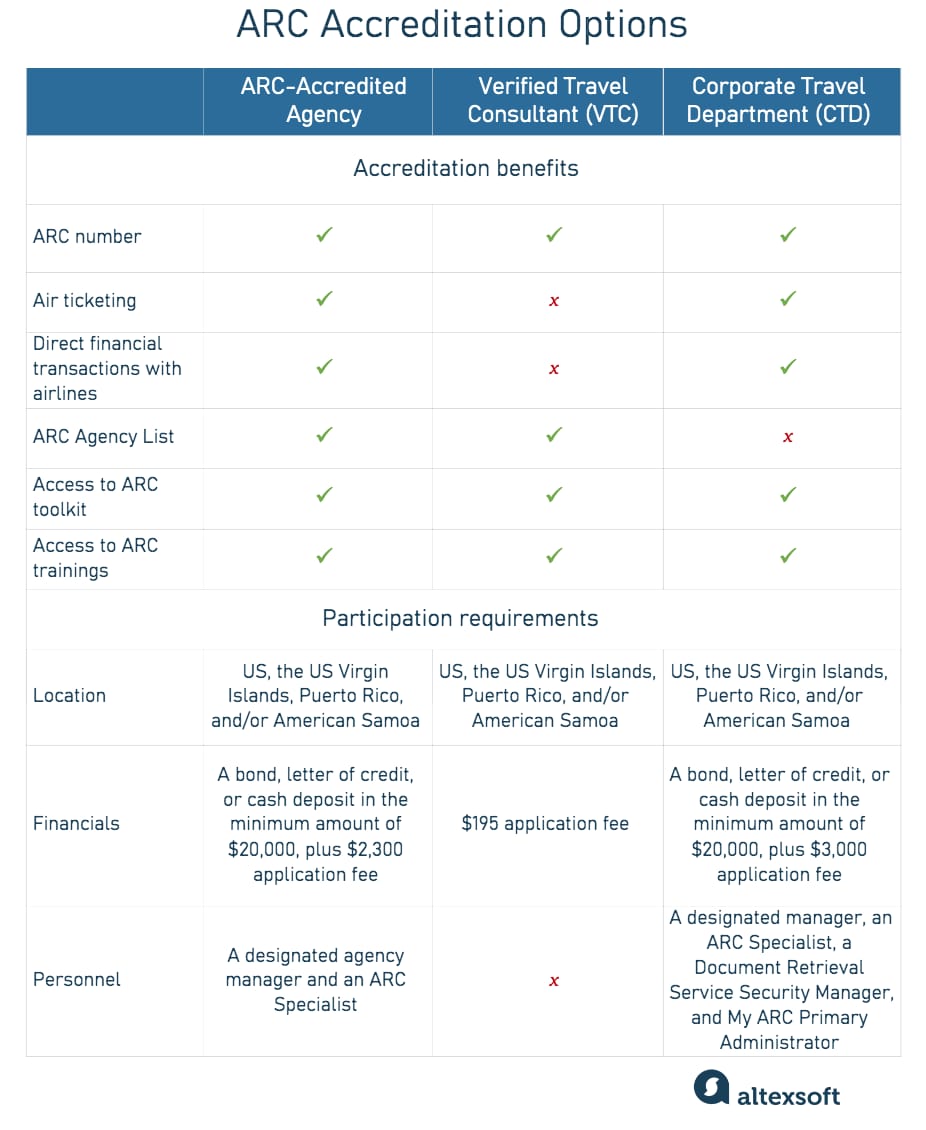 Comparing ARC accreditation types
Comparing ARC accreditation types
ARC-Accredited Agency for issuing flight tickets
Who is it for? This is a standard option for US-based agencies wanting to sell airline tickets.
How to apply? This is how to become an ARC-Accredited agency.
- Prepare the following documents:
- travel agency license,
- confirmation of an established bank account with ARC,
- a bond or a bank statement for $20,000.
- Designate an ARC Specialist in your office who must pass the certification.
- Complete the application form.
- Pay the fee and submit your application form with required documents.
- Pass an interview.
How much does it cost? The application fee is $2,300, and the annual location fee is $228.
The application process must take around 90 days. You can read more about it in the Industry Agents’ Handbook and in the FAQ section.
Verified Travel Consultant for non-ticketing agents
Who is it for? This option is for you if you’re a US-based agency and don’t plan to issue airline tickets. For example, when you don’t book many flights but still want access to supplier inventory and the recognition that comes with ARC.
How to apply? To apply for a Verified Travel Consultant:
- Review the VTC Agreement and Handbook.
- Fill the application form.
- Pay an application fee.
How much does it cost? This is a fairly low-cost option since you don’t need a $20,000 bond or bank statement, and the application fee is only $195.
Verification takes on average 30 days. You can find out more about the program in the FAQ section or on the dedicated landing page.
Corporate Travel Department for non-travel businesses
Who is it for? This option is specifically created for US-based non-travel organizations that regularly book travel for their employees and would benefit from direct relationships with travel suppliers. This allows corporations to act as their own travel agents and eliminate commissions paid to middlemen.
How to apply? This is how to apply for a Corporate Travel Department.
- Prepare the following documents:
- a bond or a bank statement for $20,000.
- an IRS Employer Identification Number (EIN).
- Assign an ARC Specialist Qualifier and a Manager Qualifier (they can be the same person).
- Meet the ticketing security standards.
- Complete the application form.
- Submit the form, payment, and the required documents.
How much does it cost? The CTD application fee is $3,000 with a $206 annual fee.
For more details, review the Corporate Travel Department Reporting Agreement (CTDRA) and visit the FAQ section.
CLIA credentials for cruise booking
Cruise Lines International Association (CLIA) is the world’s largest cruise industry trade association, representing 95 percent of the ocean-going cruise capacity. Their members include 50+ cruise lines, 54,000 travel agents, and 15,000 travel agencies.
Although CLIA is capable of influencing the industry, it doesn’t have any power to enforce rules or regulations, so it’s not unusual for cruising companies to operate outside of CLIA membership. For example, CLIA has no representation across the continent of Africa.
Still, CLIA offers the only industry-recognized credential program, which might benefit those who are selling cruises and seeking to grow in the cruise segment. It’s called a CLIA Number.
A CLIA ID Number identifies you as a seller of cruises to vendors and suppliers and allows you to book cruises and receive commissions. It serves the same purpose as the IATA agency code. Also, every agent in your agency can apply for an individual CLIA EMBARC ID. Let’s review these options.
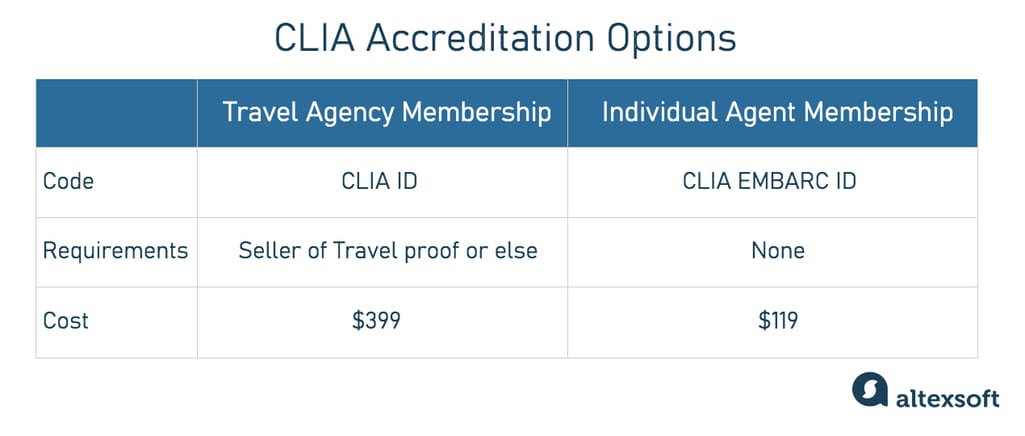 CLIA accreditation overview
CLIA accreditation overview
Travel Agency Membership (TAM)
The Travel Agency Membership is CLIA’s main credential. The TAM program provides you with a CLIA Industry ID number, which you can use to directly book with CLIA’s member cruise lines and partners. You can view the whole list of their affiliates here, and you will find that they include Carnival, Disney Cruise Line, Royal Caribbean, Norwegian Cruise Line, and many more industry leaders. At the same time, vendors and suppliers can check your ID on CLIA’s website to verify that you’re in good standing in the industry.
Other than that, it includes such benefits as:
- Special commissions and discounts – in your membership welcome package, you get a coupon booklet for special commissions, and the program itself provides bonus commissions, special discounts, as well as discounts on office supplies and technology.
- Members-only information – access to special webinars, news digests, and other latest information on the cruise industry.
- Promotion – a listing on CLIA’s Agent Finder platform, where vacationers can find your agency by postal code, promoting you as a credible professional.
- Ability to join CLIA as Individual Agent Members – Only agents affiliated with CLIA’s TAM can get an Individual Agent Membership, which comes with its own set of benefits. We will cover this option below.
Who is it for? Any host or storefront travel agency that wants to book cruises directly.
How to apply? The application is fairly simple. Just provide proof that you’re meeting all federal, state, and local ordinances relative to making such sales.
How much does it cost? The TAM verification costs $399, and the annual renewal fee is also $399. If you want to have a listing with Agent Finder, it costs $19.95.
Create an account on CLIA to access more information and apply for TAM. There’s also a Premier Agency Membership (PAM) – an exclusive partnership of select agencies, which is invitation-only.
Individual Agent Membership (IAM)
Any travel agent working with a TAM-verified agency can apply for Individual Agent Membership with CLIA. The main benefit is obtaining a CLIA EMBARC ID – a personal card, which, just as CLIA agency ID, gives industry recognition, exclusive partner commissions, and other member benefits.
Apart from that, CLIA is very focused on education and professional certification, so the membership gives you access to training and certificate programs to develop your professional skills.
What’s important is that you don’t need IAM to book with your agency’s CLIA number. So it’s not a booking credential but rather a special program with extra perks.
Who is it for? Travel agents selling a lot of cruises who are affiliated with a TAM agency and want access to CLIA’s certification program or an EMBARC ID.
How to apply? Agents are approved through their TAM agency, not CLIA, so let them know that you want to apply. Though CLIA recommends that an agent have a history of sales and at least $5,000 in commissions annually.
How much does it cost? The application and the annual fee are $119 if you’re affiliated with a TAM agency and $69 for PAM.
Suffice it to say, IAM is very popular among cruise agents for its training programs and the promo via the Agent Finder platform, especially considering that the application process is very simple.
Read more about CLIA membership and certification options is a separate post.
CCRA TRUE accreditation for niche travel booking
CCRA originally stood for Computerized Corporate Rate Association, but throughout its history forged into a different meaning. Today, it’s a travel association that facilitates commerce between travel professionals and suppliers. Their accreditation program called TRUE (Travel Retailers Universal Enumeration) does the same thing IATA, CLIA, and ARC do – provides verification for agencies and opens access for direct booking of travel services via TRUE codes. So what benefits does it offer?
Direct booking from travel suppliers. The way a TRUE code is different from all of the previously mentioned accreditations is that it gives access to more types of travel service providers: tour operators, car rental companies, hotels, insurance providers, air consolidators, amusement parks, and cruise lines. Among their vast network of suppliers are hotel groups Accor, Hilton, and IHG, tour operator Contiki, a car rental brand Hertz, and tour booking platform GetYourGuide – overall, over 150 big and smaller suppliers to partner with.
Dashboard with useful tools. Members get access to the dashboard, helping them run their businesses. It comprises resources and tools for agencies, such as templates, training and education webinars, supplier training, etc.
There are two options for obtaining a TRUE code: a regular TRUE accreditation and TRUE Host. The difference is in how many employees are working for you, and the cost is different, too. The application process is the same for both options.
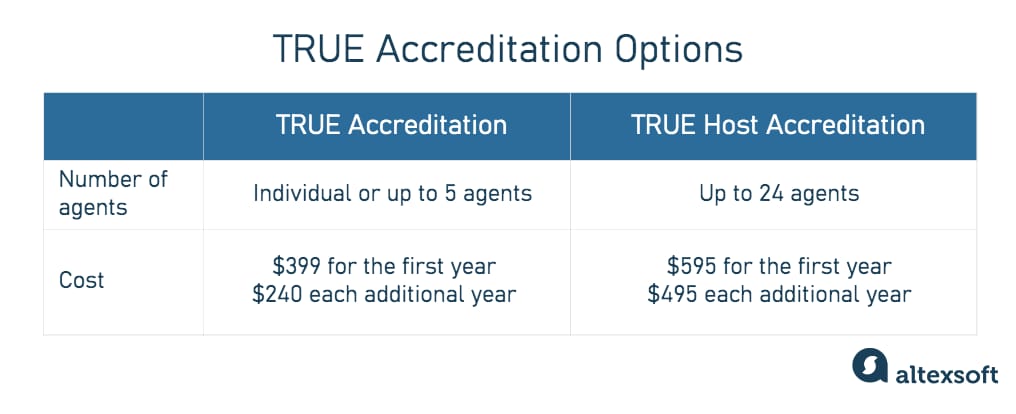 TRUE accreditation overview
TRUE accreditation overview
Who is it for? TRUE accreditation is suitable for niche agents and agencies, so they can build valuable relationships with suppliers that won’t be accessible directly otherwise.
How to apply? These are the steps to becoming a TRUE-accredited agency or agent.
- Prepare the following documents:
- proof that you’re a sole proprietor,
- proof that you’re meeting your state’s requirements as a seller of travel,
- proof that you have at least 6 months of travel selling experience,
- 3 business references,
- proof of an active bank account in good standing.
- Submit a form and payment.
How much does it cost? The regular TRUE accreditation costs $399 for the first year and $240 for each additional year, while the TRUE Host accreditation is $595 for the first year and $495 for each additional year.
You have 30 days after the payment to submit all required documents. Read more about the TRUE program here.
Accreditation overview: IATA vs ARC vs CLIA vs TRUE
Let’s sum it all up. What accreditation should you choose? Answer a few questions to decide.
If you want to book air and ticket on your own, your options are
- full IATA accreditation (if you’re outside of the US),
- full IATAN accreditation (if you’re in the US),
- ARC Accredited Agency (if you’re in the US).
If you want to book air and have ticketing managed by someone else, you can apply for
- TIDS (if you’re outside of the US),
- IATAN non-ticketing (if you’re in the US),
- ARC Verified Travel Consultant (if you’re in the US).
If you want to book flights for your organization (Corporate Travel Department), choose these programs:
- IATAN non-ticketing,
- ARC Corporate Travel Department.
If you want to book cruises, you have one choice – CLIA.
If you’re a niche travel agency booking hotels, tours, car rentals, etc., apply for TRUE.
Also, remember that if you’re not using the services of a host agency yet but don’t want to go through the ordeal of applying for ticketing options, you can join a host agency or an airline consolidator for an easier route. Check out our article on host travel agencies to learn more.
We also have a guest post written by Amadeus about ticketing without accreditation. You may want to check that out, too.
We hope this clears things up for you. Let us know in the comments what you want us to explain next.

